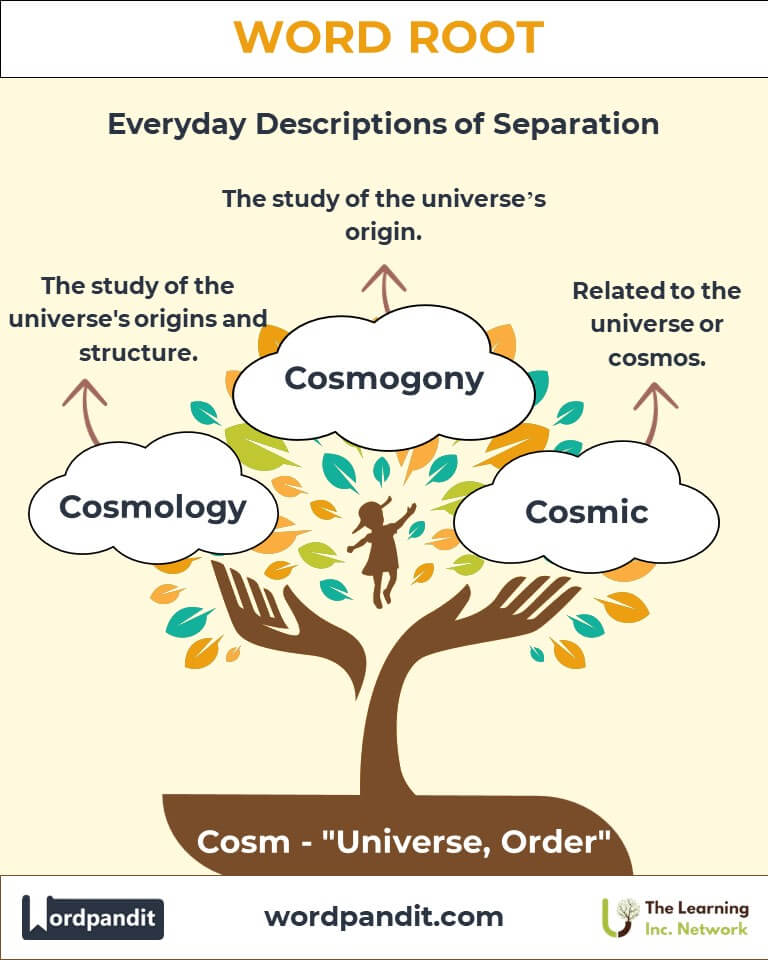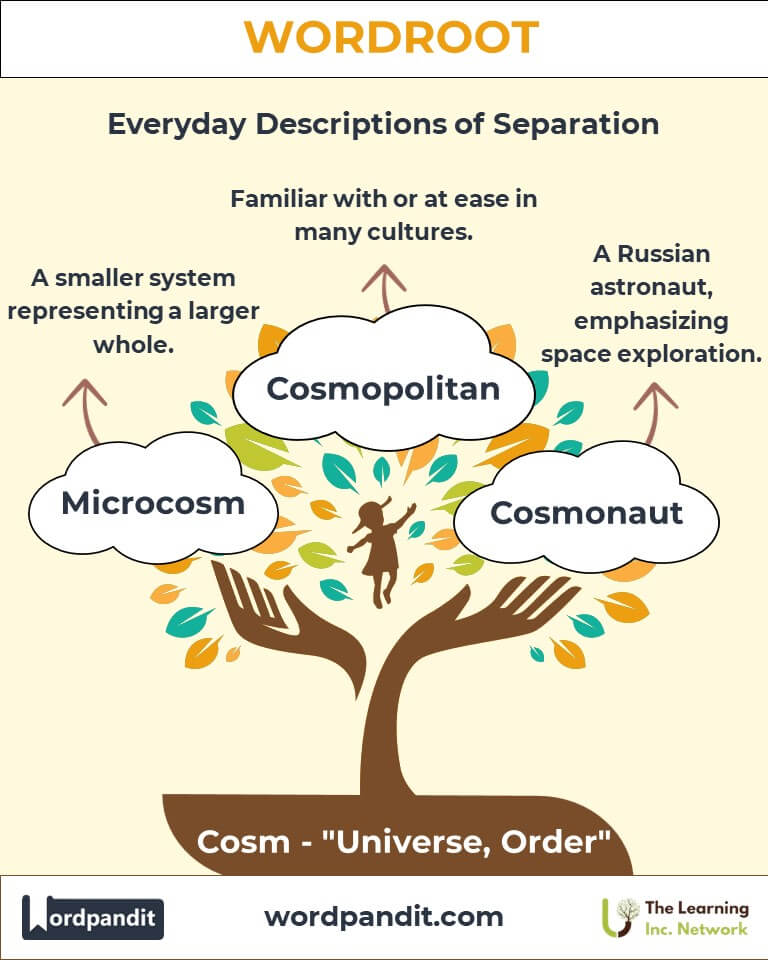Cosm: The Root of the Universe in Language and Discovery
Discover the vast potential of the root "Cosm," derived from the Greek word "kosmos," meaning universe or order. Found in words like "cosmic" and "cosmopolitan," it bridges the realms of science, philosophy, and culture, offering insights into our place in the cosmos.

Table of Contents
- Introduction: The Infinite Meaning of Cosm
- Etymology and Historical Journey
- Mnemonic: Unlocking the Power of Cosm
- Common Cosm-Related Terms
- Cosm Through Time
- Cosm in Specialized Fields
- Illustrative Story: Cosm in Action
- Cultural Significance of Cosm
- The Cosm Family Tree
- FAQs about the Cosm Word Root
- Test Your Knowledge: Cosm Mastery Quiz
- Conclusion: The Enduring Legacy of Cosm
1. Introduction: The Infinite Meaning of Cosm
What connects the sparkling night sky to the hustle and bustle of a cosmopolitan city? Both embody the essence of the word root "Cosm." Pronounced as "kohz-m," this Greek-derived root means "universe" or "order." From scientific inquiries into the cosmic vastness to cultural reflections of global interconnectedness, "Cosm" bridges the tangible and abstract, giving voice to humanity's quest for understanding.

2. Etymology and Historical Journey
The word root "Cosm" originates from the ancient Greek word kosmos, meaning universe, order, or arrangement. The term was used by Greek philosophers like Pythagoras and Plato to describe the harmony and structure of the universe. During the Renaissance, with the revival of classical knowledge, "Cosm" entered scientific and cultural vocabularies, becoming the foundation for terms like "cosmography" (the mapping of the universe) and "cosmos."
3. Mnemonic: Unlocking the Power of Cosm
Picture a meticulously ordered galaxy, its stars and planets moving in perfect harmony. This image symbolizes the essence of "Cosm": the universe as a realm of order and beauty.
Mnemonic Device: "Cosm captures the cosmos—where order meets the vast universe."
4. Common Cosm-Related Terms
- Cosmic (koz-mik): Related to the universe or cosmos.
- Example: "The discovery of cosmic rays reshaped our understanding of space."
- Cosmopolitan (koz-muh-pol-i-tuhn): Familiar with or at ease in many cultures.
- Example: "New York City is known for its cosmopolitan vibe."
- Cosmos (koz-mohs): The universe regarded as an orderly system.
- Example: "Ancient philosophers viewed the cosmos as a manifestation of divine harmony."
- Microcosm (my-kroh-kahz-uhm): A smaller system representing a larger whole.
- Example: "The classroom acted as a microcosm of society."
- Cosmogony (koz-mog-uh-nee): The study of the origin of the universe.
- Example: "Cosmogony explores the theories of how the cosmos began."
5. Cosm Through Time
- Cosmography (Historical): The description or mapping of the universe.
- Evolution: Once central to exploration, it paved the way for modern astronomy.
- Cosmonaut (Modern): A term for Russian astronauts, emphasizing exploration of the cosmos.
- Significance: Highlights humanity’s ambition to transcend Earth’s boundaries.
- Cosmetic (Shift in Meaning): Originally linked to order and adornment, now refers to beautification.
- Insight: Reflects the evolution of "Cosm" from universal order to personal aesthetics.
6. Cosm in Specialized Fields
- Astronomy:
- Cosmic radiation: Energy particles from the universe’s outer reaches.
- Application: Aids in understanding space phenomena.
- Philosophy:
- Cosmology: The study of the universe's origins and structure.
- Impact: Bridges metaphysics and science.
- Cultural Studies:
- Cosmopolitanism: Advocates global citizenship and cultural integration.
- Relevance: Promotes unity in a diverse world.
7. Illustrative Story: Cosm in Action
In a small observatory, Mia, an aspiring astronomer, marveled at the cosmic splendor through her telescope. As she explored the stars, she dreamt of joining a diverse team of researchers in cosmopolitan hubs worldwide. Her passion for the cosmos inspired her to study cosmology, where she uncovered theories about the universe's origins. Mia's journey reflected the harmonious interplay of science and culture, unified by the root "Cosm."
8. Cultural Significance of Cosm
"Cosm" resonates deeply across cultures, symbolizing unity amidst diversity. In ancient Greece, "kosmos" signified harmony in the universe. Today, "cosmopolitan" captures the spirit of global interconnectedness. Whether through art, literature, or science, the root "Cosm" reminds us of humanity's shared origins and aspirations to explore the unknown.

9. The Cosm Family Tree
- Astro- (Greek: "star"):
- Astronomy: The study of celestial bodies.
- Astrology: The interpretation of stars' influence.
- Univers- (Latin: "all, whole"):
- Universe: The entirety of existence.
- Universal: Applicable everywhere.
- Macro- (Greek: "large"):
- Macrocosm: The universe as a whole.
- Macroscopic: Visible to the naked eye.

10. FAQs About the Cosm Word Root
Q: What does "Cosm" mean?
A: The root "Cosm" comes from the Greek word "kosmos," meaning "universe" or "order." It represents harmony and arrangement, both in the physical universe and abstract concepts.
Q: What is the origin of "Cosmos"?
A: "Cosmos" originates from the Greek concept of "kosmos," describing the universe as an orderly system. Unlike "chaos," it reflects balance and harmony in nature and the universe.
Q: How are "Cosmopolitan" and "Cosm" connected?
A: "Cosmopolitan" derives from "Cosm" and the Greek word "polites" (citizen), meaning "citizen of the world," reflecting global cultural interconnectedness.
Q: Is "Cosmetic" related to "Cosm"?
A: Yes, "cosmetic" comes from the Greek root "kosmos." Originally, it meant arranging or ordering something beautifully, later referring to enhancing physical appearance.
Q: What does "Microcosm" signify?
A: A "microcosm" is a smaller representation of a larger system, such as a classroom reflecting societal dynamics.
11. Test Your Knowledge: Cosm Word Root Quiz
1. What does "Cosm" mean?
2. Which word describes a global citizen?
3. What is Cosmogony?
4. What does "Microcosm" represent?
5. What field studies cosmic radiation?
12. Conclusion: The Enduring Legacy of Cosm
The root "Cosm" connects humanity to the universe and its infinite possibilities. From exploring cosmic mysteries to fostering cosmopolitan ideals, it inspires a sense of wonder and unity. As we continue to seek answers about our place in the cosmos, the root "Cosm" will remain a guiding star, reminding us of the beauty and order inherent in existence.













